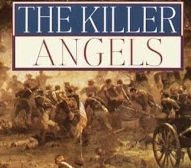KILLER THEATER
Recreating in part the pivotal Civil War battle fought 150 years ago this July, Lifeline Theatre’s labor of hate, powerfully staged by Matt Miller, is as cinematic as theater can get in three dimensions. Commissioned for the company, Karen Tarjan’s 2004 adaptation of Michael Shaara’s much-praised novel (made into the 1993 film 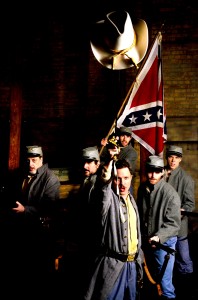 Gettysburg) dynamically delivers three days of all-consuming combat’”lost opportunities, failed strategies, brilliant tactics, reversals and upheavals. Above all, we hear, feel, see and endure the too-human factors of fear and fury as flesh and blood meet cannonballs, bayonets, and bullets en masse.
Gettysburg) dynamically delivers three days of all-consuming combat’”lost opportunities, failed strategies, brilliant tactics, reversals and upheavals. Above all, we hear, feel, see and endure the too-human factors of fear and fury as flesh and blood meet cannonballs, bayonets, and bullets en masse.
The Killer Angels works well and hard to humanize the carnage that sprawled over a Pennsylvania countryside in high summer as General Meade’s Union troops accidentally blundered into Gen. Robert E. Lee’s Rebel horde. (When a bunch of Confederates seeking shoes in the town of Gettysburg met their enemy, an accident became a holocaust from July 1-3, 1863.) Seldom has the eloquence of energy been so palpable: This swirling Lifeline stage pulsates and detonates with its revolving scaffolding, portmanteaux that double as barricades, and busy wardrobe of rapidly changed costumes in blue and gray.
As the Troubadour, Matt Fletcher delivers period classics from both sides (such as the always glorious “Battle Hymn of the Republic” and ’˜”Just Before the Battle, Mother”) that expose the emotions that warfare tries to conceal. The other noises’”sound designer Stephen Ptacek’s ferocious and deafening cannon fire and 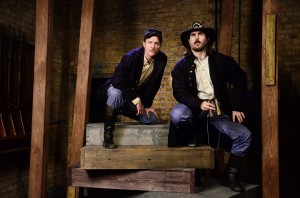 whizzing grape shot’”leave next to nothing to the imagination.
whizzing grape shot’”leave next to nothing to the imagination.
Along the bloody way we meet two handsome and valiant survivors, fighting brothers from Maine (Michael McKeough and Zach Livingston, the former playing a gentle Bowdoin professor) who anchor their valor in a strong conviction against the evils of slavery and the expendability of those who defend it. Representing the disloyal opposition, Joe Flynn plays a very British Coldstream officer who, observing the mayhem, praises the South for its old-school adherence to land and tradition when the North represents too much unprocessed change. (This in part explains how they 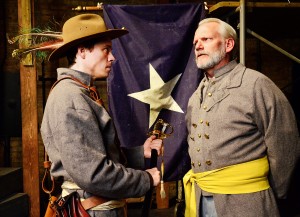 lost their Empire.) The 10-member ensemble makes an unforgettable band of brothers.
lost their Empire.) The 10-member ensemble makes an unforgettable band of brothers.
So much at Gettysburg was a question of luck and location. Besides the “homefield advantage” of fighting on your own turf, the Union secured the advantage of commanding heights like Little Round Top, Culp’s Hill and Cemetery Ridge. Lee’s smaller forces were rapidly depleted in gallant but doomed attempts (like Pickett’s Charge, here strangely without the famous rebel yell) to dislodge the “blueberries” and their deadly artillery.
Mistakes were measured in blood: Sickle’s insubordinate withdrawal of his men from the Union center, Ewell’s failure to capture the advantage of high ground, the abject failure of J.E.B. Stuart to monitor Meade’s movements and warn Lee about the encroaching Yankees.
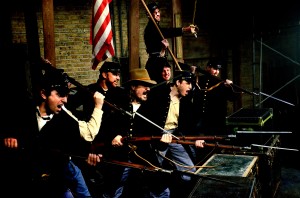 But, like the brothers who die for different sides, it’s the profiles in courage amid the “fog of battle” that lift these two hours into a kind of theatrical glory. Don Bender’s Lee incarnates weathered wisdom, implacable will and, ultimately, toxic remorse over the loss of a war as much as this panic in Pennsylvania. Among many memorable hit-and-run depictions are Tom Hickey’s cautious Longstreet (sadly vindicated by the secessionists’ defeat), Steve O’Connell’s over-eager George Pickett and noble Reynolds, and Flynn as an actor turned spy who provides the graycoats with priceless reconnaissance. Then there are the coordinated attacks, with the soldiers’ deaths indicated, not by blood bags exploding in their costumes, but by the simple removal of their uniforms as they return to the rolling rack to assume new ones.
But, like the brothers who die for different sides, it’s the profiles in courage amid the “fog of battle” that lift these two hours into a kind of theatrical glory. Don Bender’s Lee incarnates weathered wisdom, implacable will and, ultimately, toxic remorse over the loss of a war as much as this panic in Pennsylvania. Among many memorable hit-and-run depictions are Tom Hickey’s cautious Longstreet (sadly vindicated by the secessionists’ defeat), Steve O’Connell’s over-eager George Pickett and noble Reynolds, and Flynn as an actor turned spy who provides the graycoats with priceless reconnaissance. Then there are the coordinated attacks, with the soldiers’ deaths indicated, not by blood bags exploding in their costumes, but by the simple removal of their uniforms as they return to the rolling rack to assume new ones.
You are there and suddenly Shakespeare’s history plays get reinvented. After all, there’s not one emotion that erupted on Gettysburg that wasn’t “rehearsed” at Agincourt, Tewkesbury and Bosworth Field.
photos by Suzanne Plunkett
The Killer Angels
Lifeline Theatre, 6912 N. Glenwood
scheduled to end on October 27, 2013
EXTENDED to November 24, 2013
for tickets, call 773.761.4477 or visit http://www.lifelinetheatre.com
for info on this and other Chicago Theater, visit http://www.TheatreinChicago.com
